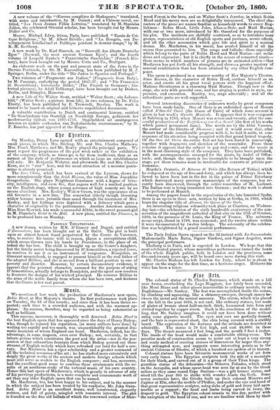Busit.
We mentioned last week the production of Macfarren's new opera, Robin Hood, at Her Majesty's theatre. Its first performance took place on Tuesday, the 2d of this month ; and since then it has been thrice re- peated ;- each time to a crowded audience, and with the warmest ap- plause. Its success, therefore, may be regarded as being substantial as well as brilliant.
This success, moreover, is thoroughly well deserved. Robin- Hood is the best English opera that has appeared since the days of Henry Bishop; who, though he injured his reputation, (as many authors have done) by writing too rapidly and too much, was unquestionably the greatest dra- matic musician of whom England can boast. Macfarren, indeed, has the advantage, in some respects, even over Bishop ; not, certainly, in that inborn genius which constitutes the poet and the artist—not in the pos- session of that exhaustless fountain from which Bishop poured out those streams of English melody which have refreshed our land for half a cen- t*. But Macfarren has a riper scholarship and a greater command of all the technical resources of his art ; he has studied more extensively and deeply the great works of the ancient and modem foreign schools which must still serve as models to the English composer ; and has, moreover, had the excellent good sense to combine these attainments with the re- sults of this assiduons study of the national music of his own country. Hence this last opera of Macfarren's, which is greatly in advance of any of his previous productions, is a more complete and consummate work of art" han any older English opera that can be named. Mr. Macfarren, too, has been happy in his subject, and in the manner in which the subject has been treated by his coadjutor, Mr. John Oxen- ford. Robin Hood is an excellent drama, well cone:Meted, elegantly written, and full of gaiety, mingled with romantic interest. The plot is founded on the fine old ballads of which the renowned outlaw of Sher- wood Forest is the hero, and on Walter Scott's Ivanhoe, in which Robin Hood and his merry men are so delightfully introduced. The chief cha- racters of the piece are names familiar as household words to every Eng- lishman: Robin Hood, Little John, Allan-a-Dale, and Maid- Marian, with one'or two more, introduced by Mr. Oxenford for the purposes of his plot. The incidents are skilfully contrived, SC as to introduce busy groups, representations of old English sports and pastimes, scenic effects, and all the other accessories which give life and spirit to a musical. drama. Mr. Macfarren, in his music, has availed himself of all the means thus presented to him. The songs and ballads—those especially which belong'to the parts of -Robin Hood and Maid Marian—are melo- dious and expressive ; but it is chiefly in the scenes of concerted music— those scenes in which numbers of persons are in animated action—that Macfarren has put forth all his strength, and shown a greater mastery of musical combination than has been attained by any other English com- poser.
The opera is produced in a manner worthy of Her Majesty's Theatre. Sims Reeves, in the character of Robin Hood, outdoes himself as an actor, and exerts all his great vocal powers with the happiest effect. Madame Sherrington is a charming Maid Marian. Though new to the stage, she acts with graceful ease, and her singing is perfect in style, ex- pression, and execution. Santley, too, sings admirably ; and all the subordinate parts are well supported.


























 Previous page
Previous page